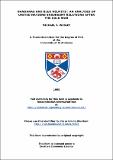Files in this item
Bandanas and blue helmets : an analysis of United Nations-insurgent relations after the Cold War
Item metadata
| dc.contributor.advisor | Wilkinson, Paul | |
| dc.contributor.author | Wesley, MIchael S. | |
| dc.coverage.spatial | 459 | en_US |
| dc.date.accessioned | 2015-04-16T15:09:44Z | |
| dc.date.available | 2015-04-16T15:09:44Z | |
| dc.date.issued | 1995 | |
| dc.identifier | uk.bl.ethos.576492 | |
| dc.identifier.uri | https://hdl.handle.net/10023/6506 | |
| dc.description.abstract | This is an examination of a neglected class of relations that have become more common after the Cold War, those between the United Nations and sub-State insurgent groups. This relationship has changed significantly after the end of the Cold War, both in the nature and frequency of the United Nations' response, and in the character of the insurgents that are addressed. Observing a strong influence of realism in both the motivations of insurgent actions and in the determinants and constraints of United Nations security initiatives, this study hypothesises that the predominant determinant of the effectiveness of United Nations-insurgent interactions is an essential concurrence in their approaches to the interaction. The research design develops an analytical framework of approach indicators to test the validity of this hypothesis across a range of United Nations-insurgent interactions. Those interactions chosen for analysis are Mediation; Peacekeeping, including Monitoring Ceasefires, Humanitarian Peacekeeping; and Disarmament and Demobilisation; and Election Monitoring. United Nations interactions with contemporary insurgent movements - the FMLN, the Khmer Rouge, the Bosnian Serbs, Renamo, the USC-SNA, the Contras, and Unita - are chosen according to their operational viability in order to fully test the hypothesised relationship. The general support for the hypothesis revealed by the analysis suggests important conclusions for the planning and conduct of United Nations initiatives, which are increasingly being called on since the Cold War to intervene in civil wars. | en_US |
| dc.language.iso | en | en_US |
| dc.publisher | University of St Andrews | |
| dc.rights | Creative Commons Attribution-NonCommercial-NoDerivatives 4.0 International | |
| dc.rights.uri | http://creativecommons.org/licenses/by-nc-nd/4.0/ | |
| dc.subject.lcc | JX1981.P7W4 | |
| dc.title | Bandanas and blue helmets : an analysis of United Nations-insurgent relations after the Cold War | en_US |
| dc.type | Thesis | en_US |
| dc.type.qualificationlevel | Doctoral | en_US |
| dc.type.qualificationname | PhD Doctor of Philosophy | en_US |
| dc.publisher.institution | The University of St Andrews | en_US |
This item appears in the following Collection(s)
Except where otherwise noted within the work, this item's licence for re-use is described as Creative Commons Attribution-NonCommercial-NoDerivatives 4.0 International
Items in the St Andrews Research Repository are protected by copyright, with all rights reserved, unless otherwise indicated.


